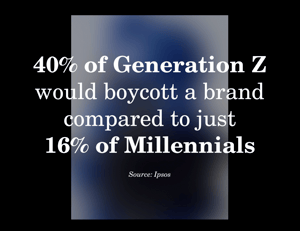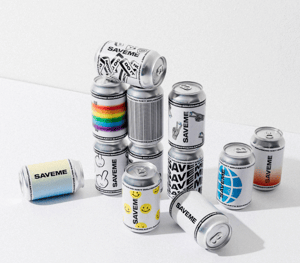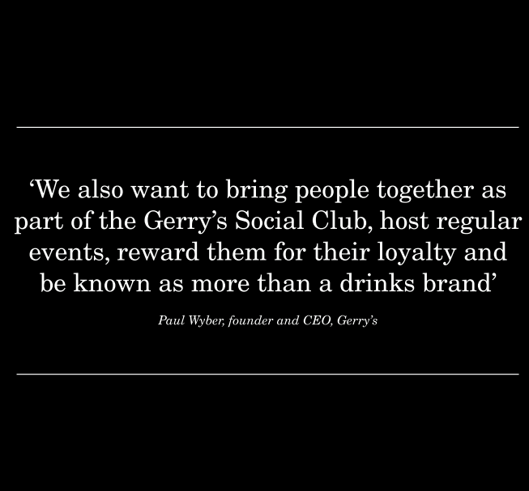RESOURCES
The Future of Digital Loyalty
Hyper-aware, hyper-connected and hyper-individual, Generation Z are challenging brands in search of a more equitable value exchange...
EVENT TRANSCRIPT: SESSION 2
Generation Z Loyalty
This is a transcription of Chris's keynote session from our Digital Loyalty event recorded in February 2022.
Good evening. My name is Chris, I'm co-founder of The Future Laboratory, and we are a trend forecasting, strategic innovation and consumer insight business. And in this presentation, I'm going to start to explore how I think really is quite a diverse and disruptive cohort that we call Generation Z or that are starting to demonstrate interesting and innovative mindsets and behaviours, especially when it comes to brands, engagement and loyalty.
Now, if I was going to ask you to take one takeaway, one key learning from our research, it would be that we're talking about a generation that is hyper-aware, hyper-connected and hyper-individual. And as a result, they are challenging brands in search of more equitable value exchange. They're even more brand promiscuous than the millennials and that my generation, Gen X is, or are.
And living at the height of cancel culture. This generation is, I think, more than almost any other is highly educated in the woke washing behaviours of businesses. And as a result, they are often, I think, quite brand disloyal as a result. And I think the way technology is changing, it's certainly becoming easier for young people to support or to disown a brand when they feel they no longer uphold the same values that they do.

Chris Sanderson
co-Founder, The Future Laboratory
Chris is co-founder of The Future Laboratory, where he is responsible for delivering the company’s extensive global roster of conferences, media events and Trend Briefings, which he presents in London, New York, Sydney, Melbourne and around the world. His keynotes have been booked by luxury group Kering, European Travel Commission, Retail Week, Selfridges, Marks & Spencer, Chanel, Harrods and more.
Now, according to some recent research from Ipsos, 40% of Gen Z would boycott a brand compared to just 16% of that older cohort the millennials, and further research from Ipsos shows that 86% of UK Gen Z shoppers have already walked away from a brand because they have heard or experienced something they didn't like about it.
And I think this sense of brand disengagement is for many of us who have grown up with brands and maybe now work as part of a brand and where brand loyalty is. So in limit to our experience of our relationship with consumerism, this kind of ability, um, that this generation has to just switch off and change loyalty is, is actually both alarming from a professional perspective, but also quite perplexing, From an engagement perspective, what we're beginning to see, I think with our major landscape, beginning to shift towards what you could call authentic activism and the sense of, a more sort of engagement with issues like environmentalism and ecology.
 That's about inspiring accessibility. That's about getting stuck in getting engaged, being part of the solution. Gen Z is already demonstrating how brands can act as partners and help facilitate the change. And just the simple words, I think start to demonstrate a very different type of hierarchy that is beginning to emerge.
That's about inspiring accessibility. That's about getting stuck in getting engaged, being part of the solution. Gen Z is already demonstrating how brands can act as partners and help facilitate the change. And just the simple words, I think start to demonstrate a very different type of hierarchy that is beginning to emerge.
And if I was going to give you one word, which maybe you don't use as part of your normal language every day, but it's great to maybe slide into a pub conversation. It's this notion that we're moving from very much a brand and social hierarchical engagements to heterarchy cool ones, ones that are actually more networks, more federated and more democratic, archaic. It's a great word to just drop into a conversation makes you sound super smart.
"With the media landscape shifting towards authentic activism and inspiring accessibility, Gen Z are demonstrating how brands can act as partners and help facilitate the change they seek"
The brands embracing Gen Z's desire to tackle issues
I think with gen Z, we're beginning to understand that their attitudes towards problem-solving towards partnering and towards engagement is already well underway. Okay, so the Made Good campaign there, I'm looking at this idea of wrecking the future and even the language there, I think really starts to show us about this shift towards a generation that really, I think, trying to find their own sense of authenticity and realness, even if at times it, it feels cranky.
It feels, like the reversible fan authentic and it just feels totally alien. But I think that's also a really exciting thing about this generation. I think we've, we've been through it sort of 20 to 30 year period of brand cohesion and brand homogeneity. And now I think we really begin to see what both with Gen Z and the generation coming behind them Generation Alpha, this real sense of a different type of approach, a different tone of voice and a different opinion, which, you know, you either find scary or you find refreshing.
 Personally, find it super refreshing. We're beginning to see hand-in-hand with this, of course, a new emerging class of community-run brands that really do understand this notion of partnering and engagement that are turning customers and consumers into creators. And again, this collaborative approach towards brand is part of the shift that we're beginning to see.
Personally, find it super refreshing. We're beginning to see hand-in-hand with this, of course, a new emerging class of community-run brands that really do understand this notion of partnering and engagement that are turning customers and consumers into creators. And again, this collaborative approach towards brand is part of the shift that we're beginning to see.
Community Brands
We're beginning to see how brands are inviting their consumers to contribute to the aesthetic and the voice of their products. And equally on screen, what you've got here is SAVEME, which is a direct to consumer water brand, a DTC brand that so allowing customers to shape both the messaging and the design aesthetic that's available online and in-store, and through their online portal, consumers can create their own canvas and use bold and, you know, and striking typographical features and, create their own message on the cans, which they can then buy for themselves or upload onto the store and share with their friends.
And this, this notion of collaboration I think, is really so critical. We're seeing so much of this, I think, in, in the F&B category and how also these two categories are expanding beyond products and they're starting to offer useful services, platforms, communities, engagement, portals, in a way to, I think, become more and more enmeshed in the everyday lifestyle of their customer and to better understand customer mindset and customer behaviour.
Nurture Networks
We're seeing this quite a lot in the non-alcoholic beverage sector. So one of the examples that we've looked at recently is the alcohol-free beer brand Freestar. They recently launched a free WhatsApp hotline, which offers advice for unemployed Gen Z and they can book sessions with experts from businesses like Proper Corn or Tesla in the UK and the BBC in order to get some one-to-one guidance on how to prepare for an interview, how to write a good CV, they get follow-up calls from their mentor.
And, and it's very much about this idea of starting to think about how you accompany the consumer on their life journey and start to become a partner with them in their life. And the sense I think of how brands foster a more loyal consumer relationship through actually presenting a very human face and a very human way of thinking about engaging is one of the most critical things that's going on here. It's that it's no longer based on loyalty points.
It's not about earning money, you know, earning credits those push-pull engagement factors that we've seen of previous brands. Today it's far more based on the understanding.
Well, how would I look after my friend? What would I expect from my friend? What does loyalty mean to me and my best mate? And I think this means that we start to see some really interesting opportunities for creating meaningful and purposeful connections through service offerings outside our normal product categories.
 On screen is the low alcohol brand Gerry's. And I think they're another really great example building its brand on the concept of championing both physical and mental health, obviously this ties in quite neatly with their no and low alcohol stance. And they have a social club that offers events pop-ups and a roster of social gatherings that were aimed at building physical and mental wellbeing through their customer community.
On screen is the low alcohol brand Gerry's. And I think they're another really great example building its brand on the concept of championing both physical and mental health, obviously this ties in quite neatly with their no and low alcohol stance. And they have a social club that offers events pop-ups and a roster of social gatherings that were aimed at building physical and mental wellbeing through their customer community.
And, and when we spoke to Paul Weibo, who's the founder and CEO of Gerry's. He said to us, we also want to bring people together as part of the Gerry social. Hosting regular events, rewarding customers for their loyalty and to be known as more than just a drinks brand.
And I think that goes right to the heart of the issue here, which is this way in which we start to think beyond our core product offer and think about the peripherals that surround our brand, but that increasingly are more meaningful than the actual product itself.
When of course you start to think about the metaverse and how more and more of us as consumers and customers are beginning to make that journey through, from an understanding of a product as a solid thing. And a product is something that might just sit within a digital environment, a digital universe of whatever that platform might be.
Direct-to-Fan
Moving on. I think I mentioned, uh, DTCs earlier, the growth of the direct to fan relationship of course is increasingly important. And when we see platforms like Only Fans and Patreon continue to grow at the time that more old-fashioned social platforms like Facebook of course, are in decline.
Media brands are moving towards these more intimate fan engagement models because they can understand the traction and the engagement point. And this presents an opportunity, especially I think for food and drink brands to take cues from creators and how they interact directly with fans and how they start to structure rewards into this personalised kind of offering environment.
Fandom and loyalty and also amplification start to all coalesce and come together. We start to see how things like the e-sports organisation FaZe Clan has launched an incubator program that turns its fans into potential recruits and how that really helps them to boost global conversations, content output, and also the promotion of its activities.
So it's this far more integrated approach to thinking about above and below the line marketing, consumer engagement, product sales, and then of course, loyalty programs and really how we can't just take one in isolation. We have to keep thinking about what happens when we put all of those together. And again, I think that's such an important part of what we're looking at.
Crypto-Clubs
Now for us, one of the other really interesting growth areas is this notion of crypto clubs. Part of the language moving forward here, as we start to think about the growth of cryptocurrencies, and we start to think about the idea of often, really quite diverse, quite particular, and quite low key memberships, groups, opportunities, and platforms. And, you know, we heard from Joel earlier who talked about this point, that you know, our job, I'm afraid, for those of us on this call and watching your marketers and who are involved in the notion of brand engagement, you know, our jobs, aren't getting any easier. They're getting harder!
As consumers increasingly shun mainstream platforms, cyber-savvy consumers are gathering in decentralised social spaces that use blockchain to unlock elite communities. $HEAT is creating a new cultural reputation token providing tangible exposure for crypto-creators; Cultural membership Friends With Benefits is powered by a community who all share rebellious values.
"What makes Gen Z so interesting, which is that they are part of a broker generation. It's about buying and selling. It's about trading. It's about partnership. It's about exchange. It's no longer this top-down relationship where you're the seller and they're the buyer."
Chris Sanderson - The Future Laboratory
Loyalty is a Relationship, Not a Programme.
The idea of the one size fits all marketing message just really doesn't wash anymore. And our job is to be as bespoke and as individual and as diverse and as different as our customers are. And we've got to work quite hard in order to do that because we've got to be able to find the right tone of voice at the right moment to have these conversations and find ways of taking them off the main platform and have them in an ever-increasing world of difference and diversity.
And the sense I think of how we begin to see emerging platforms which of course is central to the metaverse conversation that most of us are beginning to dip our toes into is this notion of how we foster a more democratic relationship with users, how we start to maybe offer payment or partial ownership in exchange for that data, that content and their engagement. And this is where I think brands have a real opportunity because what we're beginning to see in the long-term over the next 10 years, of course, is how all of those traditional structures that were about the early days of the internet, before 3.0 really starts to kick in.
It was about what we got in exchange for our data for free. And we often didn't really realize as customers quite what we were giving away. And of course, as we now look at the power of our Googles and our Facebooks we start to rethink and recalibrate actually what we're prepared to pay for and what we're prepared to give away.
And this ongoing conversation sits at the heart of what makes Gen Z so interesting, which is that they are part of a broker generation. It's about buying and selling. It's about trading. It's about partnership. It's about exchange. It's no longer this top-down relationship where you're the seller and they're the buyer.
And therefore you sit at the top, you push and pull and you just expect them to consume product. I mean, those kinds of days are over and we see how, you know, kind of websites and platforms like Sheet, start to create new cultural reputations through things like tokens, that provide tangible exposure for crypto creators. That take us beyond likes and follows that start to take us into these relationships and these engagements where users can reward tastemakers with heat, to show recognition for work personalities or contributions to the community.
And it's the sense of how we reward, how we recognise because again, recognition and reward sit at the heart of a successful loyalty relationship. And I would really urge you to start dropping the word program.
When you think about loyalty and start to use the word relationship, because that does start to change the way that we think about what it is that we're offering. When we start to look at new other networks, like friends with benefits and how we start to see cultural memberships that are powering communities of say web artists who all share the same kind of value system.
I think we start to see the opportunities here when that launched in March, 2021, it had a waiting list of 3000 and it now manages its popularity by gating the community with crypto tokens and also having a really strict vetting process.
And, you know, while friends with benefits is built for the internet it's discord channels cover a diverse range of interests. And the platform is also beginning, now, I think to expand its influence into the real world with its members, gaining access to real-life meetings and after-parties in the music world, co-creating city guides that they described as being an experiment in de-central curation.
And so this way of starting involvement that might seem to be intangible because it's just online, but how that starts to filter out into the gen Z communities offline and their real world involvements, I think becomes really interesting.
Generation Z loyalty: think partnership, think relationship and think regenerative.
Thanks very much.
Watch the full on demand recording of this event
Nando's and The Future Laboratory share their vision for world-first customer loyalty programmes
76% of Generation Z believe their favourite brands should reward them for their patronage. Soon to become the most numerous and diverse consumer group on the planet, how do you build a loyalty product that caters to their super-charged demands, meets them where they are (on their smartphone), and gives them what they want?
